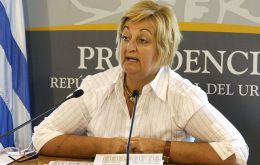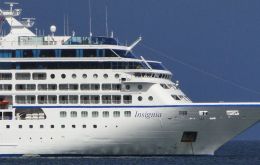MercoPress. South Atlantic News Agency
Economy
-
Wednesday, November 2nd 2016 - 14:19 UTC
EU and Canada sign free trade accord, but has to clear 40 European parliaments

The European Union and Canada signed a free trade agreement on Sunday that aims to generate jobs and growth though it must still clear some 40 national and regional parliaments in Europe in the coming years to enter fully into force.
-
Wednesday, November 2nd 2016 - 07:36 UTC
Brazilian amnesty program for overseas funds collects US$ 15.8bn

The Brazilian government collected 50.9 billion Reais, equivalent to US$15.8 billion in taxes and fines under an amnesty program offered to individuals and corporations with undeclared but legitimate funds parked overseas, the Finance Ministry said on Tuesday.
-
Wednesday, November 2nd 2016 - 07:12 UTC
A “flat” cruise season officially begins this week in Montevideo

The 2016/17 cruise season officially begins this week in Uruguay with the arrival of MS Zaandam and Insignia. Zandam belonging to Holland America Line with capacity for 1.432 passengers usually calls several times in Montevideo during the season.
-
Tuesday, November 1st 2016 - 18:36 UTC
Argentina invests heavily in major dry bulk and vegetable oils port terminal

Bunge and Aceitera General Deheza S.A. (AGD) announced they will jointly invest US$100 million in Puerto General San Martin’s T6 industrial complex and port terminal. Puerto General San Martin is an inland port in Argentina that sits on the Paraná River.
-
Tuesday, November 1st 2016 - 12:40 UTC
EMBRAER agrees to pay US$ 205m to settle corruption charges

Brazil's aircraft manufacturer Embraer has agreed to pay some US$205 million to settle corruption charges involving sales of military and civil airplanes to four customers. records to conceal illicit payments.
-
Tuesday, November 1st 2016 - 08:11 UTC
Argentina 2016/17 wheat production estimated at 14.4m tons and 8m tons exports

Argentina’s wheat production is estimated at 14.4 million tons in 2016-17 and total exports are estimated at 8.03 million tons, the U.S. Department of Agriculture’s (USDA) Foreign Agricultural Services (FAS) said in its latest report. The main market is expected to be Brazil, the historic, natural market for Argentine wheat and flour.
-
Tuesday, November 1st 2016 - 07:57 UTC
Meirelles insists in overhaul of social security rules to restore public finance order in Brazil

Brazil must push ahead with reforms, including a proposed cap on government spending and an overhaul of social security rules, to restore long-term order to public finances in Latin America's biggest economy, according to the country's finance minister.
-
Tuesday, November 1st 2016 - 02:05 UTC
Bank of England governor will step down in June 2019, after Brexit is over

Bank of England governor Mark Carney says he will step down in June 2019. It means he will serve one additional year beyond the five-year term he committed to when he took the post, but will still be two years short of the usual eight years governors serve.
-
Tuesday, November 1st 2016 - 01:30 UTC
Insignia marks the official beginning of the cruise season for Punta Arenas

With the arrival this Monday of M/V Insignia to Punta Arenas in the extreme south of Chile, and capital of the Magallanes region has officially declared opened the 2016/17 cruise season. It is estimated that 102.000 tourists will be visiting the region, although the number of vessel calls will drop drastically from 121 to 86.
-
Sunday, October 30th 2016 - 22:44 UTC
US economy expands at its fastest pace in two years in the third quarter

The US economy grew at the fastest pace in two years in the third quarter, initial figures have indicated. The world's largest economy grew at an annual rate of 2.9% in the three months to September, the Commerce Department said. Analysts had predicted growth of just 2.5%.
